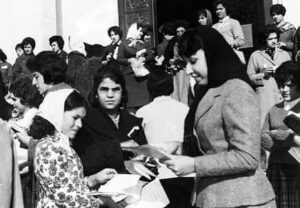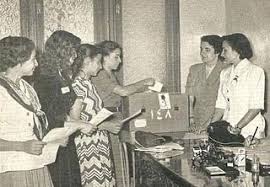Throughout history, Syrian women have played an active role in society starting from the myth of Ishtar, the goddess of fertility and beauty, through Zenobia, Queen of Palmyra up to the present moment.
The participation of Syrian women in public life began at the end of the 19th century, and this participation developed in the early and mid-twentieth century.
The first Syrian woman journalist, Marianna Marrash, who was born in Aleppo, was writing for “ Al-Janan” magazine and calling for women’s liberation in 1870. She was also the first Syrian woman to publish a collection of poetry, titled “Bint fikr” Between 1893 and 1947.
During that period women gathered in literary circles to discuss literature as well as political, social and cultural matters. Besides Marrash, who ran a literary circle from her home, journalist Maria al-Ajami was among the prominent champions of women’s rights. She founded the first Syrian women’s magazine “Al-Arous” in 1910, as well as a leading literary association in 1922.
 Moreover, Syrian women were activists within the general political and ideological fields, including the anti-colonial struggles. Nazik al-Abid was known as the “Joan of Arc of the Arabs” for her patriotic stance against Ottoman and French colonialism in Syria. In 1920 she joined the Syrian Arab Army and participated in the battle of Maysalun; and was the first woman to earn a rank in the Syrian Arab Army for her role in that battle.
Moreover, Syrian women were activists within the general political and ideological fields, including the anti-colonial struggles. Nazik al-Abid was known as the “Joan of Arc of the Arabs” for her patriotic stance against Ottoman and French colonialism in Syria. In 1920 she joined the Syrian Arab Army and participated in the battle of Maysalun; and was the first woman to earn a rank in the Syrian Arab Army for her role in that battle.
After 1929, Adila Bayhum-Al-Jazairi emerged as the president and founder of the Syrian Women’s Union and occupied the position from 1933 to 1967.
As women became more confident about their rights, they rose to prominence in other professional fields.
-Dr. Laurice Maher was the first woman graduate from the Arab Medical Institute at Damascus University in 1930 and she went on to become Syria’s first woman medical doctor.
-Makboula Shalaq became the first Syrian female university student, graduating with a law degree in 1945.
-Alice Kandalaft was the first Arab woman at the United Nations, representing Syria in 1948.
-Dr Najah Saati became the first female pharmacist in Syria in 1949.
-Buthaynah Kayyali was the first Syrian woman to obtain a BA in civil engineering in 1953.
Given the increasing prominence of the role of women in the Syrian society , it was only natural that the call for the right to vote, as initially demanded in the 1920s by women like Nazik al-Abid and Mary Ajamy, became louder. Soon after independence, Syrian women were granted the right to vote in 1949 through Article 7 of the General Election Law. Syria was the first Arab country to grant women the right to vote in elections.
 Today, women in Syria continue to be active players in the academic, political and economic fields. Syria has an unprecedented number of women with PhDs. Dr Najah Al-Attar is the Vice President of Syria, in office since 2006. Prior to that, she was the Minister of Culture from 1976 to 2000. Dr. Bouthaina Shaaban is currently the political and media adviser to President Bashar Al-Assad. She first served as the Minister of Expatriates, between 2003 and 2008. Two hundred women stood as candidates for the July 26, 2020 Parliamentary elections. Although only 28 women were elected, given that Syria is a country transitioning out of war, the numbers are bound to increase as the country returns to normality.
Today, women in Syria continue to be active players in the academic, political and economic fields. Syria has an unprecedented number of women with PhDs. Dr Najah Al-Attar is the Vice President of Syria, in office since 2006. Prior to that, she was the Minister of Culture from 1976 to 2000. Dr. Bouthaina Shaaban is currently the political and media adviser to President Bashar Al-Assad. She first served as the Minister of Expatriates, between 2003 and 2008. Two hundred women stood as candidates for the July 26, 2020 Parliamentary elections. Although only 28 women were elected, given that Syria is a country transitioning out of war, the numbers are bound to increase as the country returns to normality.
There have been also dedicated efforts to support Syria’s growing number of women in business. The Businesswomen Committee in Damascus Chamber of Commerce, for example, was established in 2000. Among its objectives are to, promote women’s participation in the industrial and trading fields; increase women’s level of career through training courses; and to provide loans for businesswomen who start new small and medium enterprises.
Even during the terrorist war that has been waged against Syria since 2011 and has taken a heavy toll on her, she has remained steadfast and has been worker, teacher, doctor, journalist, engineer ….etc.
Basma Qaddour

